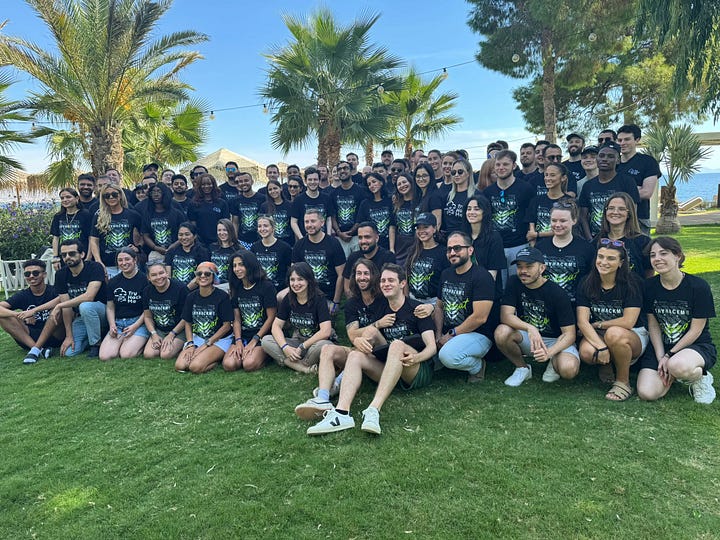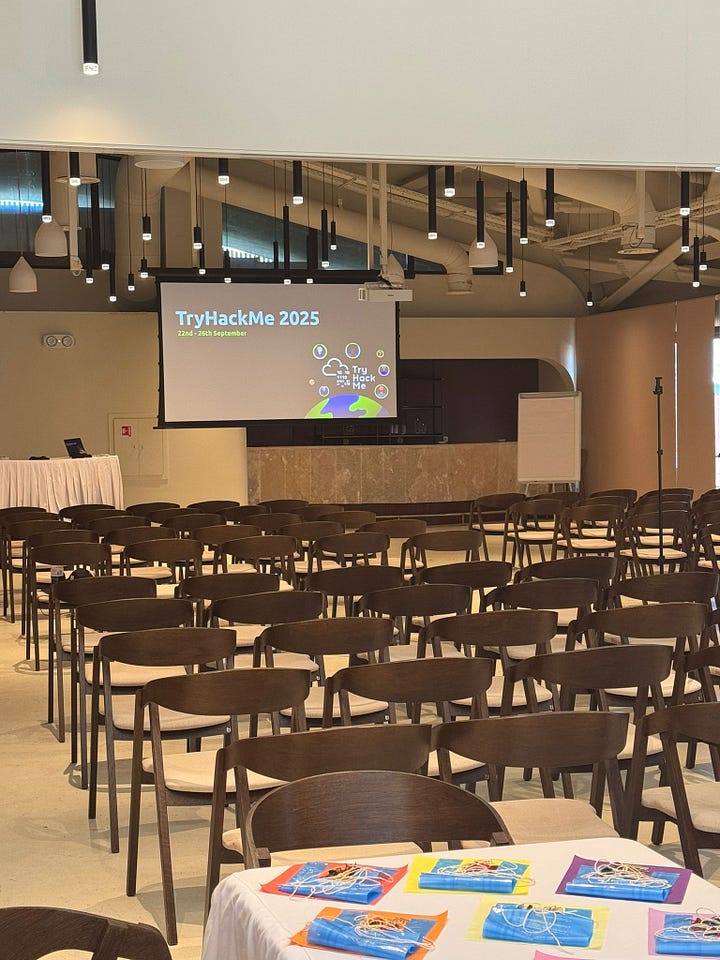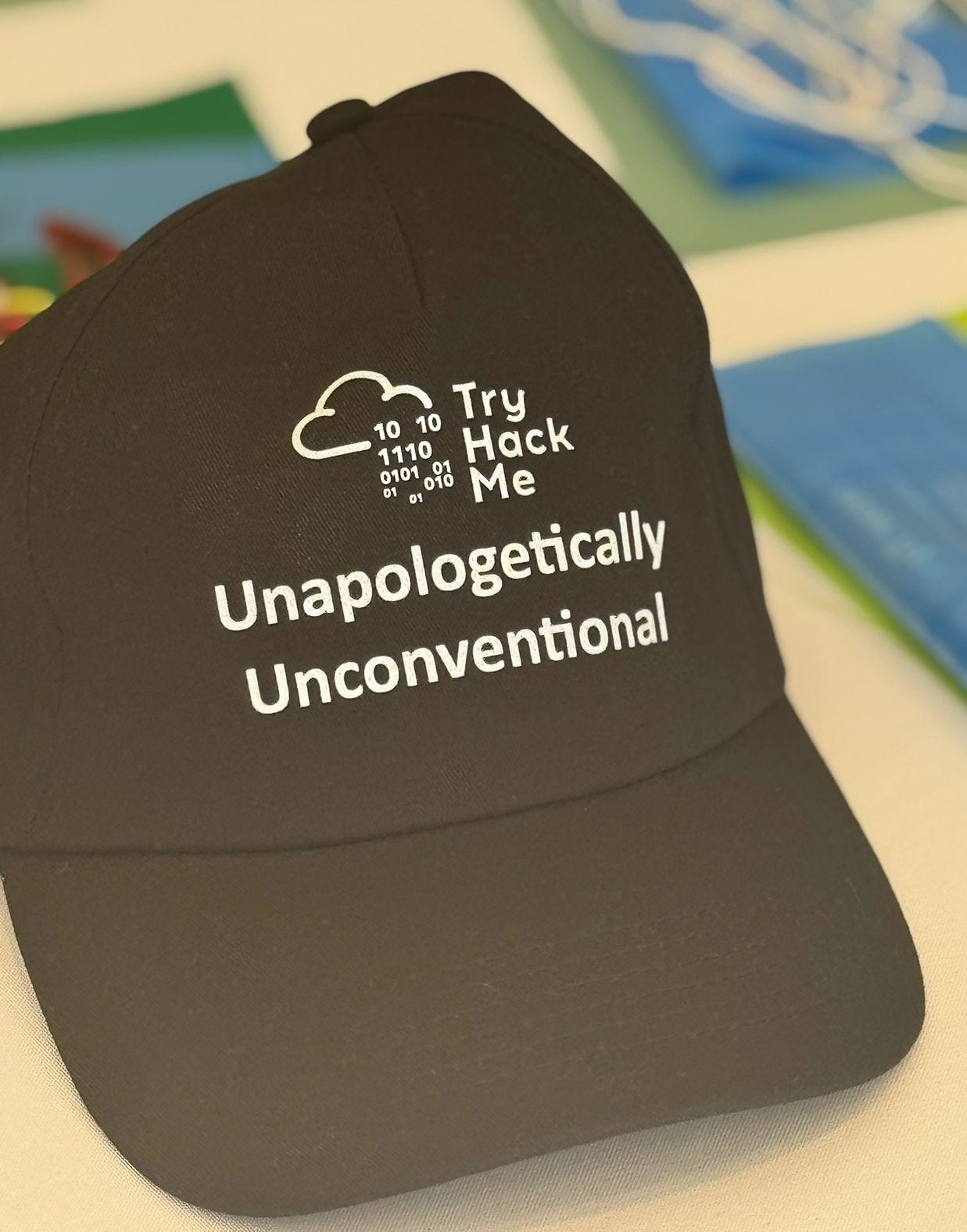Reflecting on our £400k company retreat
Observations, unexpected learnings, personal growth, and being unconventional.
Our annual company retreat for 90 people cost £300k, and 3600 hours of working time (in salaries is ~£100k); we’re ~155 people (up from 81 in 2024), but not everyone was able to attend (visa issues, internal eligibility). I’ve always struggled to understand if the spend is worth it - would the capital be better for incentives and bonuses, rather than a lavish retreat, or smaller more compact meet ups between teams. I also had a few unexpected learnings from this retreat that I talk about later in the post.


Lets start by breaking down this years structure:
Monday - Welcome presentation celebrating an insane 12 months having hit record high numbers, discussing notable stories from 2025 and an ice breaker before dinner.
Tuesday - In the morning we talk on our vision/mission, the future of education, and have content engineering breakout workshops. Followed by fun afternoon activities.
Wednesday - Live AMA with a user that got a job because of TryHackMe, content releases, finishing the morning with a talk on AI followed by a vibe coding workshop. In the afternoon we had a tour around Athens and meal out.
Thursday - This day is dedicated to teams, with department-specific workshops and social activities. The day (and retreat) concludes with an awards dinner, recognizing standout staff members.
The retreat gives us a chance to celebrate together and for people to see more than just their team. What I found was important was having teams see the impact of their work - not just how much revenue it contributed to, but how it impacted the success of other teams. For example, product and engineering listening to how sales and customer success used what they built to close a >$1M deal. This celebration also fuels internal momentum.
It’s really hard to measure a retreat’s impact. I look for signals from feedback, teams, projects, and discussions that follow. There are metrics you can track (e.g. employee retention), but it’s never easy to quantify. At the end of the day, the retreat is for the teams - the people actually getting the work done - not senior leadership or founders. I’ve come to realise the retreat doesn’t really “help with company alignment,” but it does re-energise teams to return excited and refreshed - work is more enjoyable when you know the person behind the screen. That said, I’m seeing more companies move toward smaller retreats with specific groups - for example, Ramp used one to teach product/engineering “vibe coding” and accelerate AI adoption, while Pylon ran a hackathon that shipped 40 features in just 5 days.
With the number of people attending this year, it was impossible to talk with everyone. I favoured a few deep, meaningful conversations over endless small talk - so I made sure dinner discussions went deep on a handful of topics. A few notable ones this year were:
The future of education (Echo, BADR, learning reinforcement)
How to make our offering better for businesses and universities
Whats working, and not working for user and lead generation
Inner workings of software engineering and content engineering
Why there is no innovation coming out of India
On a personal growth note - I’ve always admired how some inspiring leaders can rally their teams through powerful talks. I gave 2 this year and invested a lot of time to deliver them well - I put real pressure on myself because it’s a skill I want to build. The only way to get better at public speaking is to do more of it. I can’t share both talks publicly, but the one I did release is on why education is broken and how we need to fix it:
What I really loved about the retreat
The deep conversations listed above
Someone organised an adhoc lunch with several teams to discuss a problem restricting them from innovating. They hunted us all down at the retreat, spoke about the problem over lunch, and we walked away with a plan to build something that will lead to a ton of innovative new content on the platform.
Being reminded how talented most of our people are
Reflecting on how much we’ve achieved in 12 months
Meeting someone that got a job because of TryHackMe
Spending time with the other TryHackMe co-founder (we’re usually so busy that we rarely talk about topics not on an agenda)
Listening to the award night winners acceptance speeches
What needs changing
The retreat structure - deciding if we do one big retreat again, smaller meet-ups, or instead putting the capital into other employee benefits.
More break out sessions between teams - for example having people from marketing, sales, customer success and product all in a room to talk about 2026.
Unexpected learnings
As the company has grown, visibility and reasoning around tough decisions I’ve made often get warped through Chinese whispers - we used to be small enough that I could quickly address questions and eliminate misinformation. Over the last 12 months I’ve pushed people insanely hard, and I’m incredibly proud of how much we’ve delivered. Listening to other leaders, the awards night speeches, our long list of achievements, team conversations, and record-breaking revenue growth makes it all worth it. But pushing this hard - fixing dysfunctional teams fast, raising the talent bar - does come at a cost. Would I change it? Absolutely not - that’s the role, and the company is winning because of it.
TryHackMe has been very founder-led, and that’s been enormously successful - but so many great ideas have come from 1:1 informal conversations. I need to remind myself to plan more with the team. We’ve always worked closely with the SLT, but the people on the ground - doing the work and seeing things day in, day out - have invaluable perspectives we need to tap into more.
A skill you can develop is learning how to steer conversations toward something meaningful and deep. It doesn’t “just happen”, it’s something you teach yourself (mostly from others). Otherwise small talk dominates dinner. I’m okay at it, but have seen how others are great at navigating a conversation to “find conversation gold”.
TryHackMe is unapologetically unconventional. This means questioning everything and not doing something because it’s “what you usually do” - I’ve found a lot of comfort in thinking like this, as no founder should apologise for how they want their company to work, and the most successful companies operate differently. This doesn’t just apply to how we run the company, the team should question and challenge what is “usually done” - challenging the status quo. Its one of the reasons I’m writing this article - why would I share this so publicly and not just do it internal? Because (1) my posts lead to interesting conversations inside and outside the company, (2) I want other founders to seriously question what they want, and (3) it helps me reflect. We even had hats made for the retreat for every member of staff saying “unapologetically unconventional”.
To wrap up, the retreat this year was superb, and I had so much fun meeting everyone. Now we need to get back to work as we have 3600 hours to make up for.




Unapologetically unconventional! Love it. Thanks for sharing your reflections.